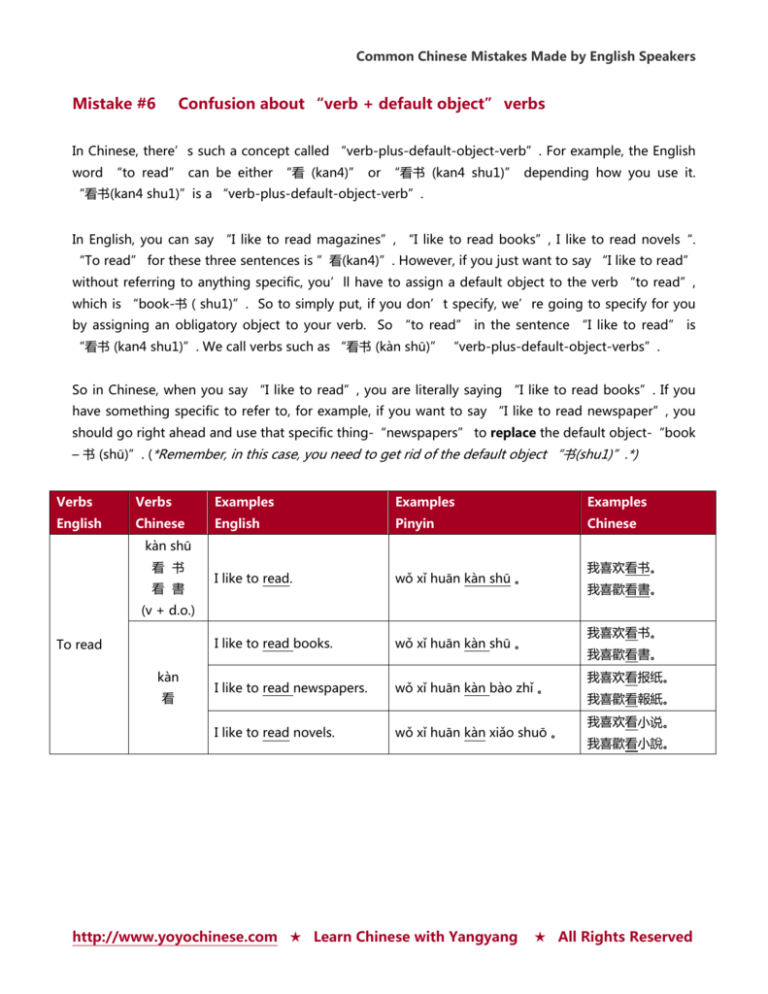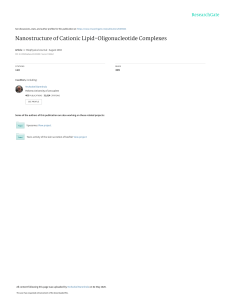
Common Chinese Mistakes Made by English Speakers
Mistake #6
Confusion about “verb + default object” verbs
In Chinese, there’s such a concept called “verb-plus-default-object-verb”. For example, the English
word “to read” can be either “看 (kan4)” or “看书 (kan4 shu1)” depending how you use it.
“看书(kan4 shu1)”is a “verb-plus-default-object-verb”.
In English, you can say “I like to read magazines”, “I like to read books”, I like to read novels“.
“To read” for these three sentences is ”看(kan4)”. However, if you just want to say “I like to read”
without referring to anything specific, you’ll have to assign a default object to the verb “to read”,
which is “book-书(shu1)”. So to simply put, if you don’t specify, we’re going to specify for you
by assigning an obligatory object to your verb. So “to read” in the sentence “I like to read” is
“看书 (kan4 shu1)”. We call verbs such as “看书 (kàn shū)” “verb-plus-default-object-verbs”.
So in Chinese, when you say “I like to read”, you are literally saying “I like to read books”. If you
have something specific to refer to, for example, if you want to say “I like to read newspaper”, you
should go right ahead and use that specific thing-“newspapers” to replace the default object-“book
– 书 (shū)”. (*Remember, in this case, you need to get rid of the default object “书(shu1)”.*)
Verbs
Verbs
Examples
Examples
Examples
English
Chinese
English
Pinyin
Chinese
I like to read.
wǒ xǐ huān kàn shū 。
I like to read books.
wǒ xǐ huān kàn shū 。
I like to read newspapers.
wǒ xǐ huān kàn bào zhǐ 。
I like to read novels.
wǒ xǐ huān kàn xiǎo shuō 。
kàn shū
看 书
看 書
我喜欢看书。
我喜歡看書。
(v + d.o.)
To read
kàn
看
http://www.yoyochinese.com ★ Learn Chinese with Yangyang
我喜欢看书。
我喜歡看書。
我喜欢看报纸。
我喜歡看報紙。
我喜欢看小说。
我喜歡看小說。
★ All Rights Reserved
Common Chinese Mistakes Made by English Speakers
The following table covers some common “verb-plus-default-object-verbs”.
Verbs
Verbs
Examples
Examples
Examples
English
Chinese
English
Pinyin
Chinese
I like to sing.
wǒ xǐ huān chànɡ ɡē 。
I like to sing Chinese
wǒ xǐ huān chànɡ zhōnɡ wén
我喜欢唱中文歌。
songs.
ɡē 。
我喜歡唱中文歌。
I want to eat.
wǒ xǐ huān chī fàn 。
What do you want to eat?
nǐ xiǎnɡ chī shén me ?
chànɡ ɡē
唱
To sing
歌
(sing + song)
chànɡ
唱
我喜欢唱歌。
我喜歡唱歌。
chī fàn
吃 饭
To eat
吃 飯
我想吃饭。
我想吃飯。
(eat + meal)
chī
吃
你想吃什么?
你想吃什麼?
kāi chē
开 车
To drive
開 車
I drive to work everyday.
wǒ měi tiān kāi chē shànɡ
我每天开车上班。
bān 。
我每天開車上班。
(drive + car)
kāi
What car do you drive?
开(開)
(lit. You drive what car?)
nǐ kāi shén me chē ?
pǎo bù
跑 步
To run
I like to run (jog).
wǒ xǐ huān pǎo bù 。
I like to run Marathon.
wǒ xǐ huān pǎo mǎ lā sōnɡ 。
(run + step)
pǎo
跑
你开什么车?
你開什麼車?
我喜欢跑步。
我喜歡跑步。
我喜欢跑马拉松。
我喜歡跑馬拉鬆。
qǐnɡ kè
To treat
请
客
My treat today.
請
客
(lit. Today I treat.)
请(請)
dance
今天我请客。
今天我請客。
(treat + guest)
qǐnɡ
To
jīn tiān wǒ qǐnɡ kè 。
I like to treat friends.
tiào wǔ
Can I invite you to dance?
跳 舞
(lit. I can invite you to
(dance + dance)
tiào
跳
dance ma?)
Can you dance Cha Cha?
wǒ xǐ huān qǐnɡ pénɡ yǒu 。
我喜欢请朋友。
我喜歡請朋友。
wǒ kě yǐ qǐnɡ nǐ tiào wǔ mɑ
我可以请你跳舞吗?
?
我可以請你跳舞嗎?
nǐ huì tiào Cha Cha mɑ ?
http://www.yoyochinese.com ★ Learn Chinese with Yangyang
你会跳Cha Cha吗?
你會跳Cha Cha嗎?
★ All Rights Reserved
Common Chinese Mistakes Made by English Speakers
shuō huà
说 话
To speak
To talk
她喜欢说话。
She likes to talk (speak).
tā xǐ huān shuō huà 。
I can speak Chinese.
wǒ huì shuō zhōnɡ wén 。
做 饭
Do you cook often?
nǐ chánɡ chánɡ zuò fàn mɑ
你常常做饭吗?
做 飯
(You often cook ma?)
?
你常常做飯嗎?
說 話
她喜歡說話。
(speak remarks)
shuō
说(說)
我会说中文。
我會說中文。
zuò fàn
To cook
(cook rice)
zuò
做
Can
food?
you
cook
Italian
nǐ huì zuò yì dà lì cài mɑ ?
http://www.yoyochinese.com ★ Learn Chinese with Yangyang
你会做意大利菜吗?
你會做意大利菜嗎?
★ All Rights Reserved








